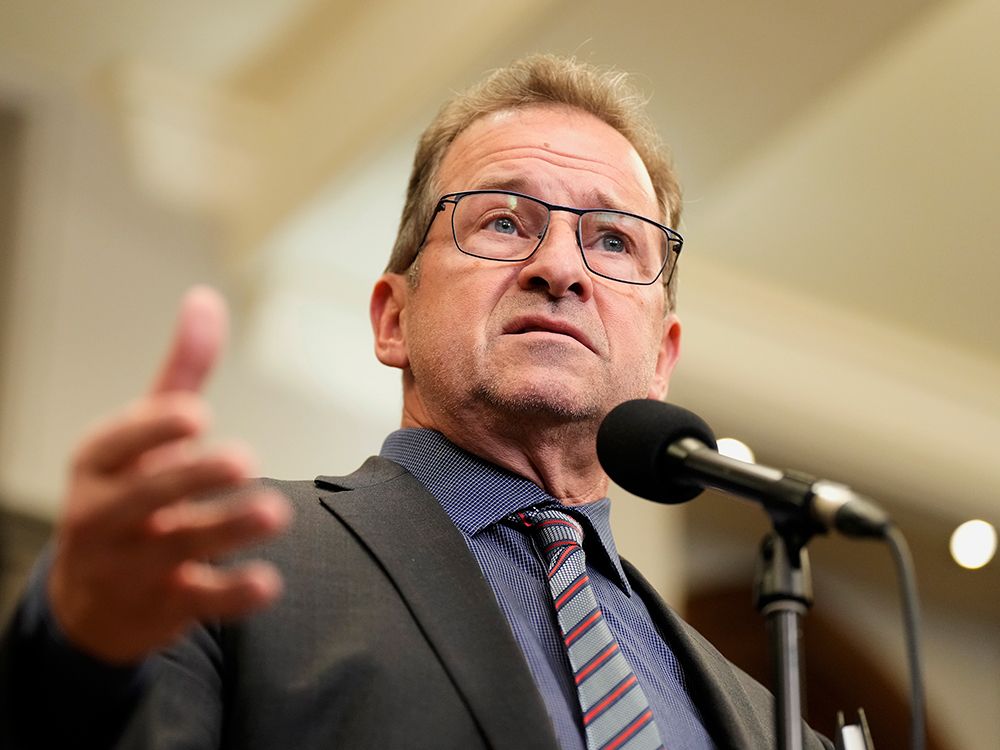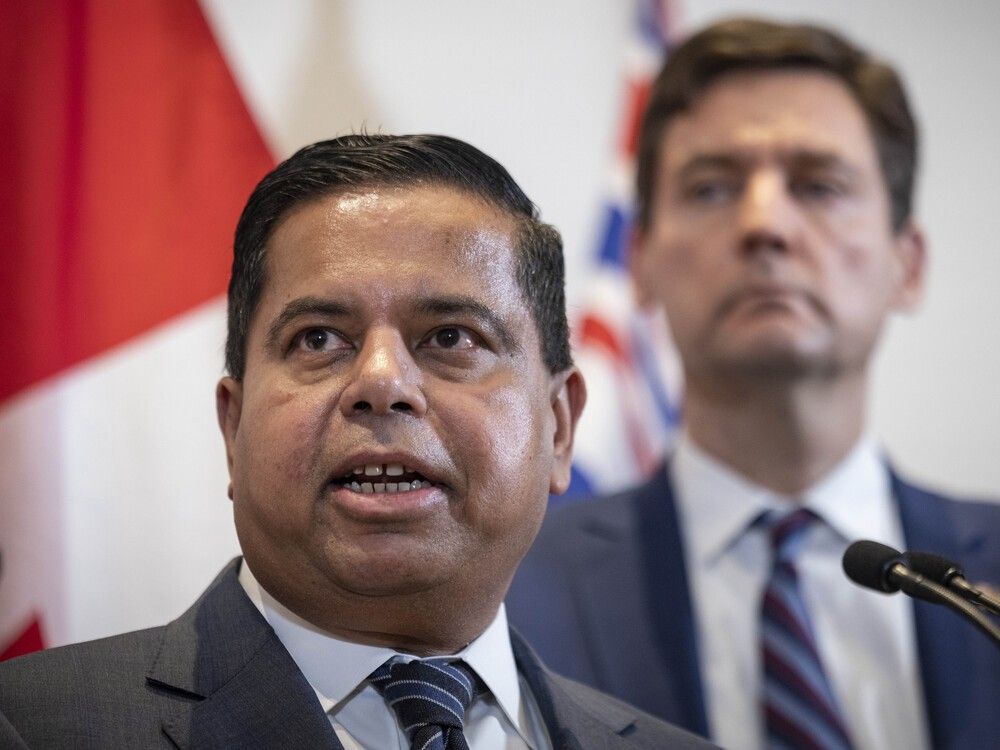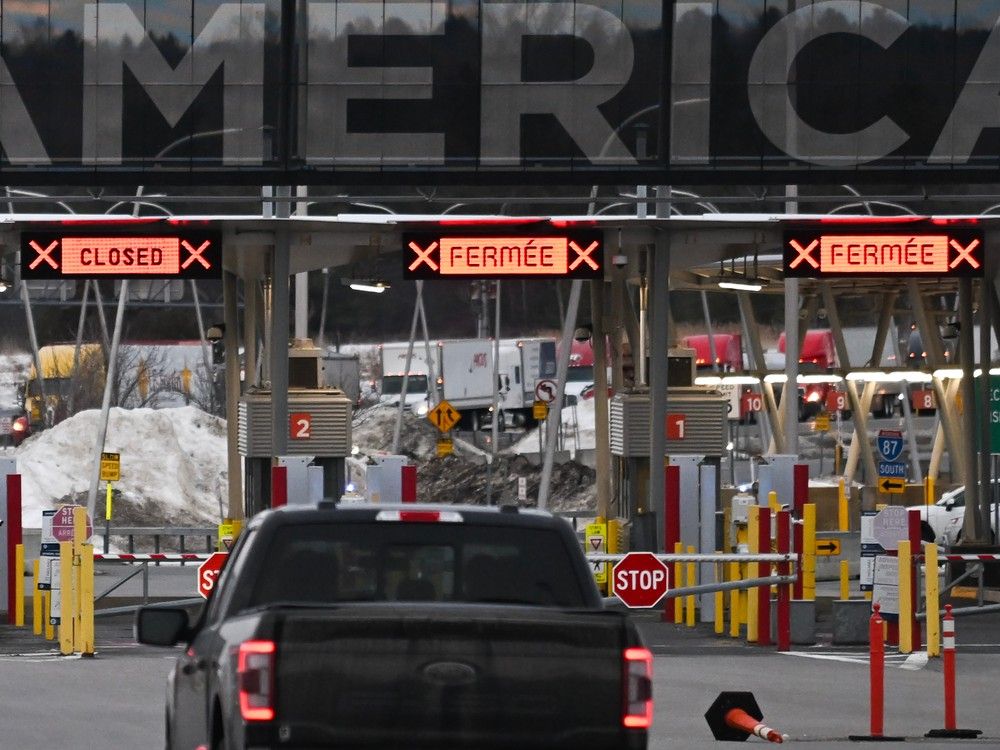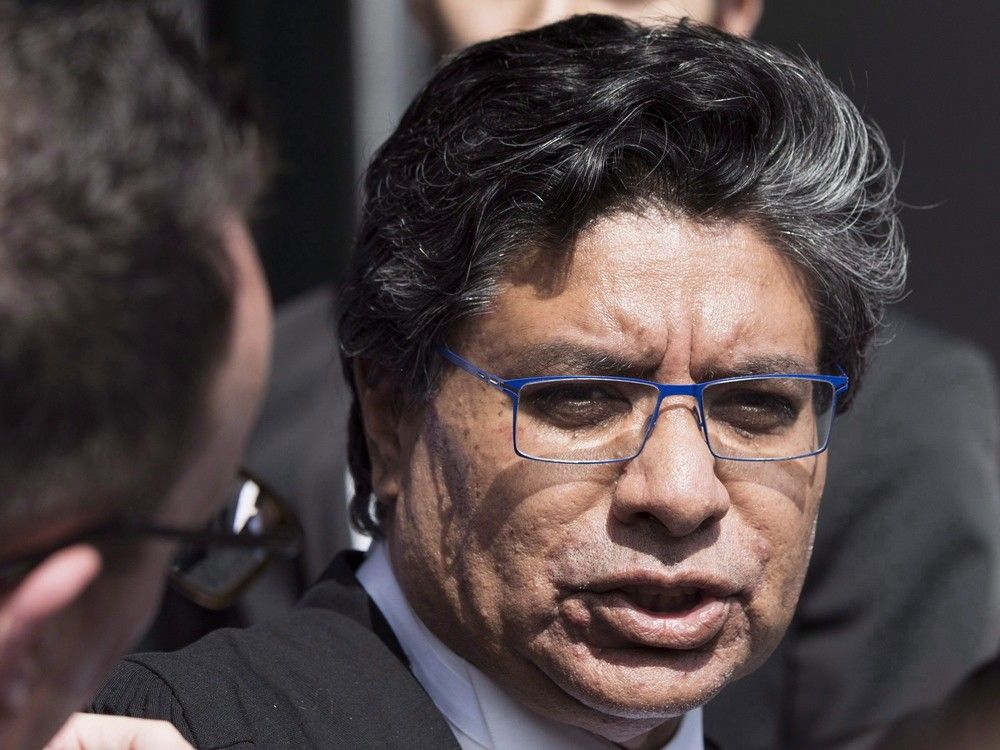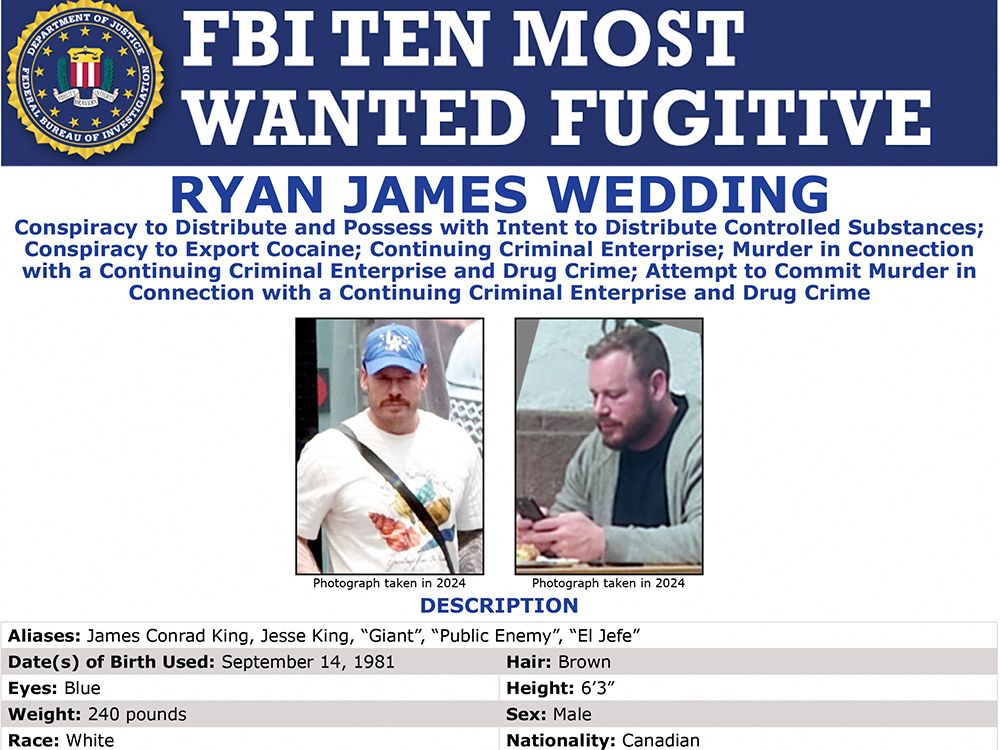
WASHINGTON, D.C. — Prime Minister Mark Carney rescinded Canada’s digital services tax (DST), a three per cent levy on digital services revenue from large domestic and foreign businesses, in June after President Donald Trump threatened to halt trade talks if the tax took effect. The repeal was a strategic move to restart stalled negotiations with the United States, which soon resumed after Carney’s announcement but were again disrupted later … by a Ronald Reagan ad. Despite removing the DST to ease tensions, Carney has little to show for it.
Still, the Cato Institute’s Adam Michel, director of tax policy studies at the Washington-based think tank, thinks that Trump did Carney and Canada a favour. He says digital service taxes hurt countries that impose them. With royal assent expected for the repeal in Parliament this month, National Post contacted Michel to learn more about his views on DSTs, Canada’s repeal, and why the push for a new global tax framework under the OECD’s 2021 Pillars One and Two has, thus far, failed.
This interview has been condensed and edited for clarity.
Q: You’ve argued that digital service taxes are bad policy but preferable to the OECD global approach. Please explain why.
A:
(The OECD’s) Pillar One is really trying to upend the entire consensus around how we allocate corporate taxing rights around the world. The consensus since the 1960s has been taxing businesses based on where they create value. Pillar One takes a piece of the corporate tax base and tries to redistribute it based on where businesses’ consumers are for a subset of large multinational firms. There are a couple of problems with that. One, it creates instability in the entire global corporate tax system by carving up a piece of the tax base and treating it differently. It basically would create a race to carve up the rest of the tax base in ways that favour particular types of jurisdictions over others. Instead of everyone coordinating on one system, it creates this new fragmented system that will ultimately unravel into a world that existed before the 1960s, when everyone came to this consensus about how we’re taxing multinational profits. That was a world where corporate profits faced multiple layers of taxes in multiple jurisdictions, which created all sorts of additional economic costs and made global trade and global business much more costly, hurting the entire global economy and local economies. That’s the economic side of the story.
Pillar One is also an infringement on national sovereignty — tax policy should be the province of national and local governments and not designed by bureaucrats in Paris through a one-size-fits-all scheme. So both of these reasons have led me to think that Pillar One is a particularly bad path forward and it is worse than what it is trying to replace, which are DSTs.
While DSTs are also destabilizing and have economic costs, they are de facto tariffs. The costs ultimately fall on the consumers in the countries imposing them. Like we economists think about tariffs, if a country puts a tariff on products coming into their country, the correct response is not to then put a reciprocal tariff on — for the United States, for example, to put a tariff on things coming in from Canada. There’s an analogy — if Canada wants to fill its harbours with rocks, the appropriate response is not for the United States to also fill its harbours with rocks but instead just to point out that Canada is inflicting economic self-harm through its policy.
Q: How do DSTs specifically distort domestic economies compared to the effects that a new global tax base would have on multinational firms?
A:
DSTs’ ultimate economic burden is largely passed on to consumers in the form of higher prices. It distorts economic decision-making by individual companies. They may choose not to do business or to do less business in the inflicting country, and ultimately, as the costs get passed on to consumers, consumers will consume less of the digital service or whatever other product these fees are being passed on to.
DSTs are particularly concerning because most of them are based on revenue, not profit. So they have varying degrees of effective tax rates based on how profitable the company is. That can have additional distortionary effects that treat different companies differently, even if they’re all subject to the same tax. I think the DST has more ambiguous and uncertain economic effects in the short term.
The new global scheme doesn’t have an end form yet, but the highest cost that we know of is compliance — having to implement an entirely new corporate tax regime on every single one of these firms across 140 different countries is a tremendous economic burden. Then, each year, it’ll become more complex as countries vie for larger shares of the global corporate tax base. I think the economic effects of that will reduce global cross-border investment. But the ultimate economic impact of the tax is unknown because of its complexity. It’s hard to say if it’ll be passed on to consumers or investors or decrease innovation. Probably some of all of these things.
Q: Canada had been one of the few countries that chose not to wait on the global solution, and now it has had to walk back its DST, despite years of Liberal pledges. Is this a good thing for Canada, and if so, why? Did Trump’s pressure help save Canada from itself?
A:
Yes, it is a good thing that Canada has walked back its DST, and it was a bad decision to propose the DST in the first place. The other trade conversation involved with the broader tariffs coming from the United States, in the narrow sense of getting them to roll back the DST, I guess it could be seen as a very narrow good for Canada.
But the broader uncertainty of the Trump administration’s trade agenda is just as, if not more, destructive than the DST itself.
Trump was going to prosecute this trade war regardless of the DST, but to the extent that imposing a DST provoked additional trade uncertainty and possible higher tariff levies is layering a bad on top of a bad. Maybe the solution of the DST getting rolled back is better than the alternative of having tariffs and the DST, but it would’ve been better if none of this had happened in the first place.
Q: Given Canada’s experience with implementing and then repealing a digital services tax when faced with U.S. pressure, what lessons should Canadian policymakers take away about balancing sovereignty in tax policy with maintaining good trade relations?
A:
I think Canada and every other country should focus on designing strong pro-growth tax policies locally that don’t attempt to reach into other countries’ tax bases. This is the problem with DSTs — they’re an extra-territorial tax grab that is trying to bring a tax base into the country that doesn’t and shouldn’t exist there. This is also the problem with the OECD’s Pillar Two and Pillar One remake of the global tax system. It’s being pushed by the European Union and previously the Biden administration to create these new extraterritorial tax structures that are inherently destabilizing.
So my message to the U.S. administration, to Canada, and everywhere else around the world, is to focus on what we know works: that’s ensuring that the corporate tax system is as efficient as possible, that you have full business expensing, which I believe I saw some business leaders calling for to be implemented in Canada after the Republicans tax bill passed here, and keeping tax rates as low as possible. The several-decade march towards lower corporate tax rates has been one of the largest impetuses for increased global investment and reducing barriers to trade in the tax base.
I would focus on creating a local pro-growth environment rather than trying to find tax revenue in other countries.
Q: Is there irony in the fact that President Trump is imposing tariffs while telling Canada not to impose a DST, in terms of cost to consumers?
A:
Yes, definitely. The Trump administration’s trade agenda is schizophrenic and not well thought out. It’s most certainly hypocritical for the United States to be imposing tariffs on everyone and anyone, and then be concerned about this DST form of a tariff as well. It would be better if everyone decided to get rid of these tariff-like mechanisms and tariffs themselves. That would be the best path forward.
Q: You wrote in a recent article that “Now that Pillar One has permanently stalled, DSTs will return absent a new agreement.” Where are we most likely to see new DSTs emerge, and is the US likely to apply pressure against them, as it did with Canada?
A:
Yes. I think the current U.S. administration will certainly impose, or threaten to impose, sanctions or tariffs on countries that go forward with their DSTs. You saw this in France. They proposed to increase theirs to 6 per cent or even 15 per cent in one of the proposals, and the Trump administration made some noise about that. We should expect to see some of the proposed DSTs across Europe in places like Norway and Germany, Hungary, and Latvia. Some of those countries may choose to move forward with these levies, and they will also face rebuke from the United States.
Those US pressures seemed to be successful in the Canadian example, but I don’t think they will always be successful. There’s a lot of other trade-related noise. The Trump administration uses tariffs for everything under the sun. Sometimes it’s hard to distill the signal from the noise in these particular scenarios.
Q: What are the political dynamics in Europe and other countries driving the DST proposals despite the economic downsides you mentioned?
A:
They seem to be motivated by a populist animus against successful U.S. companies. The DSTs are almost universally designed to primarily target America’s most successful digital companies. And the thresholds and way they’re put together are often excluding other sorts of domestic firms. The politics of it is that it’s easy to say ‘Hey, let’s tax big, bad American companies and get some free money’ until the economic reality of these fees being passed on to consumers fully materializes.
Q: What are the implications for US digital firms if the DSTs do proliferate globally without a multilateral framework?
A:
It does bring costs for these firms. I’m not sure if the costs are dramatically larger than what they would have to endure under a Pillar One, 140-country, individual implementation of an entirely new tax base that will be evolving and changing every couple of years for the next several decades.
So the counterfactual is not as clear as I think a lot of people would like to believe. There are certainly costs, and they should be pointed out. Those costs are bad, but I don’t think that means that the Pillar One solution is any better. Also, Pillar One didn’t fully end the proliferation of DSTs. Pillar One basically said (a country) could choose between Pillar One or a DST, but you couldn’t have both. So I don’t think that Pillar One would’ve fully eliminated DSTs, even if it did go forward in the way it was being proposed. So I think the Pillar One universe is both — you get the compliance cost of Pillar One, and you still get some DSTs around the world. That’s the worst of all worlds.
Q: Why do you think the OECD’s global approach has failed thus far?
A: It was an incredibly difficult thing to pursue, even if everyone was on the same page. Creating a new tax base out of whole cloth through a multilateral, global instrument — that is just really, really difficult. There was lots of disagreement over how to define that new tax base, who the winners and losers were like — if you’re redistributing the tax base, you have to take it from some country and give it to another — and as those realities became clear, and with the addition of all the new compliance burden ultimately meant that it was just too heavy of a lift — too much cost for too little benefit … And as it became clear that the Trump administration was not going to be supportive. That was the final nail in the coffin. With the U.S. no longer on board, there is even less of an appetite to upend the entire existing system.
Q: What might a better international tax approach look like?
A:
The original OECD mission to eliminate double taxation of multinational profits and coordinate those systems through bilateral tax treaties works. It worked for many decades and still works. I think that the role for a body like the OECD is to continue to work on its existing framework for bilateral treaties that help eliminate multiple claims to the same profit, and the international coordination should stop there.
The boogeyman of profit shifting or companies choosing jurisdictions based on the attractiveness of their tax regime is ultimately a good thing. We want companies to do business in the places that it makes most sense for them to do business — and to force them to do business in high-tax, burdensome regulatory environments makes everyone worse off. That there’s a jurisdictional competition for business, global business investment that arises from a system of countries competing on their tax systems and regulatory environments for global business is one that makes everyone wealthier and freer, and that, I think, is an undeniable good.
Q: Prime Minister Carney made Canada’s DST go away rather quickly for Trump, but it didn’t seem to help him much with trade talks. What advice would you give the prime minister?
A:
I do not envy his position. I wish I understood what the ultimate goals are for the administration here in the US when it comes to trade. I don’t think that anyone really has a good grasp of what their end goal is or how to navigate it.
I don’t have any sophisticated advice for him other than to make Canada the most attractive place to do business in the world. Lower your corporate tax rate. Cut your tariff rates, implement full business expensing to attract domestic investment, and hold on for the unfortunately costly and bumpy ride.
National Post
Our website is the place for the latest breaking news, exclusive scoops, longreads and provocative commentary. Please bookmark nationalpost.com and sign up for our newsletters here.

